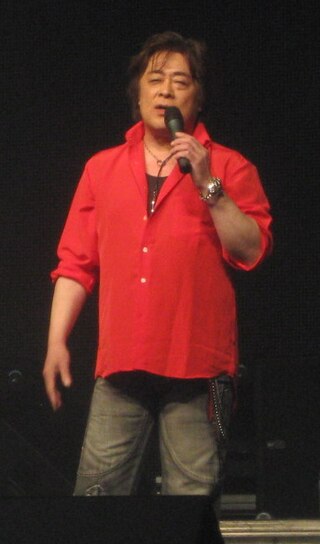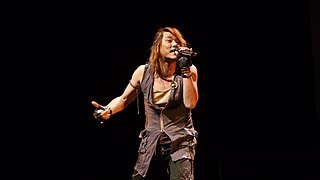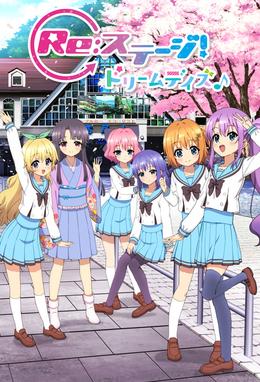
Machiko Soga was a Japanese actress and voice actress. She also performed by the stage name Stella Soga.

Kamen Rider 555, also called Kamen Rider Faiz, and stylized in English as Masked Rider 555 or Masked Rider Faiz, is a Japanese tokusatsu television drama. It is the 13th installment in the Kamen Rider Series. It is a joint collaboration between Ishinomori Productions and Toei, and was broadcast on TV Asahi from January 26, 2003, to January 18, 2004. This series was the first to use TV Asahi's current logo. It aired as a part of TV Asahi's 2003 Super Hero Time block, alongside Bakuryū Sentai Abaranger. It is the first series marking the debut of technology/cybernetics motif.

Takayuki Miyauchi, is a Japanese singer best known for his work on theme songs for tokusatsu and anime. A resident of Ibaraki Prefecture, he began his career as founding member and lead vocalist of the band "WHY" in 1981 before making his solo debut in 1984, singing the opening theme for the "Super Sentai" tokusatsu television series Choudenshi Bioman.

Toshio Hayakawa, better known by his stage name Ichirou Mizuki, was a Japanese singer, lyricist, composer, voice actor and actor best known for his work on theme songs for anime and tokusatsu. For over 50 years, he had recorded over 1,200 songs for Japanese film, television, video and video games. He was referred to by fans and fellow performers alike as the Aniki of the anison, or anime music genre. He produced the singing duo Apple Pie since 1990 and created the Anison band JAM Project in 2000.

Akira Kushida is a Japanese singer who is well known for his work in the soundtracks for anime and tokusatsu productions, most notably Taiyou Sentai Sun Vulcan, Kinnikuman, and Space Sheriff Gavan. His nickname from his fans is Kussy. His real given name is Akira.

Super Hero Time is a programming block on the Japanese television network TV Asahi featuring new episodes of tokusatsu television series from Super Sentai and Kamen Rider. Both series have decades of history and have been intertwined in the public imagination for some time, not least of all because the driving creative force behind both was manga artist Shotaro Ishinomori and both were produced by the same production company, Toei Company; however, they did not air together until 2000 with Kamen Rider Kuuga and Kyuukyuu Sentai GoGoFive, though at the time they were not acknowledged together. Super Hero Time airs every Sunday morning, from 9:00 to 10:00 JST. The block is shown all over Japan via the All-Nippon News Network. Though, in other prefectures, one or both shows can be seen on other stations which are not affiliated with ANN.

Nobuo Yamada, also known by the name NoB, is a Japanese singer. He is the former lead singer of the band Make-Up and a Project.R member.

Kamen Rider Den-O, stylized in English as Masked Rider Den-O, is the seventeenth installment in the popular Kamen Rider Series of tokusatsu programs. It is a joint collaboration between Ishimori Productions and Toei. It premiered January 28, 2007 on TV Asahi, and concluded airing on January 20, 2008. Its lead actor Takeru Satoh is the first Kamen Rider Series lead born in the Heisei period of Japanese history. It aired on the Super Hero Time slot alongside Juken Sentai Gekiranger. It is the first series marked the debut of a mythical creatures/trains motif.
Yasuko Kobayashi is a Japanese anime and tokusatsu drama screenwriter who has been involved in various television shows throughout her career, beginning in 1993 with Tokusou Robo Janperson.

Kamen Rider W, also called Kamen Rider Double, is a 2009–2010 Japanese tokusatsu drama, the eleventh series in the Heisei period run of the Kamen Rider Series and the twentieth overall. It premiered following the finale of Kamen Rider Decade on September 6, 2009, and aired alongside Samurai Sentai Shinkenger in TV Asahi's Super Hero Time programming block. Following Shinkenger's finale, it aired alongside Tensou Sentai Goseiger, until W concluded on August 29, 2010. The series is described as the "Heisei Kamen Rider 10th Anniversary Project: Fall Campaign". In the first episode of Kamen Rider Fourze, W is revealed to be in the same continuity as the original Showa timeline, making it the first series to do so since Kamen Rider Agito. The series is notable for being the first installment in what's popularly viewed as Heisei era Kamen Rider's second phase by fans. A sequel manga series, Fuuto PI, began serialization in August 2017 and an anime adaptation began airing in August 2022.

Kaizoku Sentai Gokaiger is a Japanese Tokusatsu television series and the 35th entry in its long-running Super Sentai metaseries of Japanese tokusatsu television series following Tensou Sentai Goseiger. It follows a Pirate motif, joining Kamen Rider OOO and then Kamen Rider Fourze as a program featured in TV Asahi's Super Hero Time programming block. It aired from February 13, 2011 to February 19, 2012, replacing Tensou Sentai Goseiger and was replaced by Tokumei Sentai Go-Busters. The catchphrase for the series is "Let's make it showy!".
Unofficial Sentai Akibaranger is a Japanese tokusatsu comedy drama based on the Super Sentai Series. It is not part of the official line up in Toei Company's Super Sentai franchise, but is instead a self-parody geared towards adults as opposed to a general audience for the mainstream series. The show aired on BS Asahi starting April 6, 2012, and Tokyo MX starting April 9, 2012.

"Z Densetsu (Owarinaki Kakumei)" (Z伝説 ~終わりなき革命~, "Z Legend: Neverending Revolution") is the 4th single by the Japanese female idol group Momoiro Clover Z, released in Japan on July 6, 2011.
Masayuki Ishikawa is a Japanese manga artist. He is best known for Moyasimon: Tales of Agriculture and Maria the Virgin Witch; both of which were adapted into anime television series.
Kamen Rider Amazons, known in the overseas market as Amazon Riders, is a 2016 Japanese superhero tokusatsu web drama. It is a darker and more mature reimagining of the 1974 television series Kamen Rider Amazon, and part of Toei's Super Hero Year, celebrating the 45th anniversary of the Kamen Rider Series. Amazon Riders was originally exclusively released through Amazon Video in Japan starting April 1, 2016. It was also broadcast on television on BS Asahi starting July 3, 2016, and Tokyo MX starting July 6, 2016. In a similar vein as the reboot films based on the Shōwa era series, Kamen Rider: The First & Kamen Rider: The Next, Kamen Rider Amazons takes place in an alternate universe separate from the main series timeline.

Kamen Rider Ex-Aid is a Japanese tokusatsu drama in Toei Company's Kamen Rider Series. It is the eighteenth series in the Heisei period run and the twenty-seventh series overall. Toei registered the Kamen Rider Ex-Aid trademark on June 13, 2016. The show premiered on October 2, 2016, one week after the finale of Kamen Rider Ghost, joining Doubutsu Sentai Zyuohger and later, Uchu Sentai Kyuranger in the Super Hero Time line-up., it's the first series marked the debut of a video game motif.

Uchu Sentai Kyuranger is a Japanese tokusatsu drama and the 41st entry of Toei's long-running Super Sentai metaseries. It aired from February 12, 2017 to February 4, 2018, replacing Doubutsu Sentai Zyuohger and was replaced by Kaitou Sentai Lupinranger VS Keisatsu Sentai Patranger. The program joining Kamen Rider Ex-Aid and later Kamen Rider Build in the Super Hero Time line-up on TV Asahi affiliate stations. Kyuranger is considered the fifth space-themed series whose primary motifs are constellations and Greco-Roman mythology, and it is also the first Super Sentai series to introduce nine regular members in the beginning instead of five or fewer like previous installments. The team later gains three additional members, increasing the number to twelve and becoming the largest team of the franchise so far.

Re:Stage! is a Japanese multimedia franchise by Pony Canyon and Comptiq. It features character designs and illustrations by artist Tsubasu Izumi, series composition and story by Team Yoree, and music by Kohta Yamamoto. The story revolves around female junior high school idols who aim to become a top in Prism Stage, a nationwide tournament where many middle school idols compete and become top idols. These girls are divided into several units. Their stories are serialized in monthly Comptiq and short stories are released online via the official website.

Run with the Wind is a 2006 Japanese novel by Shion Miura. The novel has received a manga and a live-action film adaptation, as well as an anime television series adaptation produced by Production I.G that aired from October 2018 to March 2019.
Maho Tomita is a Japanese actress, voice actress, and singer from Tokyo who is affiliated with Suns Entertainment. She is known for her role as Maya Tendō in the multimedia franchise Revue Starlight. In 2005, her song "Hare Nochi Hare!" (晴れのちハレ!) was used as the opening to the anime series Kamichu!














